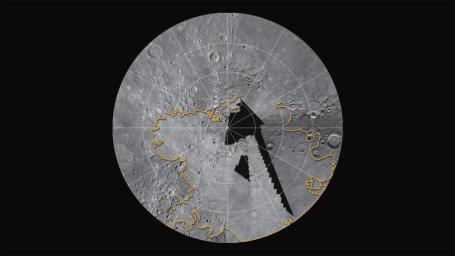
|
Mercury’s North Polar Region
- Click the image above for a larger view
- Full-Res JPEG (1280 x 720) (96.9 kB)
- Full-Res TIFF (1280 x 720) (2.8 MB)
Caption:
MESSENGER is currently filling in coverage of Mercury's north polar region, which was seen only partially during the Mariner 10 and MESSENGER flybys . Flyby images indicated that smooth plains were likely important in Mercury's northernmost regions. MESSENGER's orbital images show that the plains are among the largest expanses of volcanic deposits on Mercury, with thicknesses of several kilometers in many places. The estimated extent of these plains is outlined in yellow. This mosaic is a combination of flyby and orbital coverage in a polar stereographic projection showing latitudes from 50° to 90° N. The longitude at the 6 o'clock position is 0°.
Date Presented:
June 16, 2011, at a
NASA press conference
Instrument:
Wide Angle Camera (WAC) of the Mercury Dual Imaging System (MDIS)
Background Info:
On March 17, 2011 (March 18, 2011, UTC), MESSENGER became the first spacecraft ever to orbit the planet Mercury . The mission is currently in its commissioning phase, during which spacecraft and instrument performance are verified through a series of specially designed checkout activities. In the course of the one-year primary mission, the spacecraft's seven scientific instruments and radio science investigation will unravel the history and evolution of the Solar System's innermost planet. Visit the Why Mercury? section of this website to learn more about the science questions that the MESSENGER mission has set out to answer.
These images are from MESSENGER, a NASA Discovery mission to conduct the first orbital study of the innermost planet, Mercury. For information regarding the use of images, see the MESSENGER image use policy .
Cataloging Keywords:
| Name | Value | Additional Values |
|---|---|---|
| Target | Mercury | |
| System | ||
| Target Type | Planet | |
| Mission | MESSENGER | Mariner |
| Instrument Host | MESSENGER | Mariner 10 |
| Host Type | Orbiter | Flyby Spacecraft |
| Instrument | Mercury Dual Imaging System (MDIS) | |
| Detector | Wide Angle Camera (WAC) | |
| Extra Keywords | Color, Radio, Volcano | |
| Acquisition Date | ||
| Release Date | 2011-06-16 | |
| Date in Caption | 2011-06-16 | |
| Image Credit | NASA/Johns Hopkins University Applied Physics Laboratory/Carnegie Institution of Washington | |
| Source | photojournal.jpl.nasa.gov/catalog/PIA14340 | |
| Identifier | PIA14340 | |
